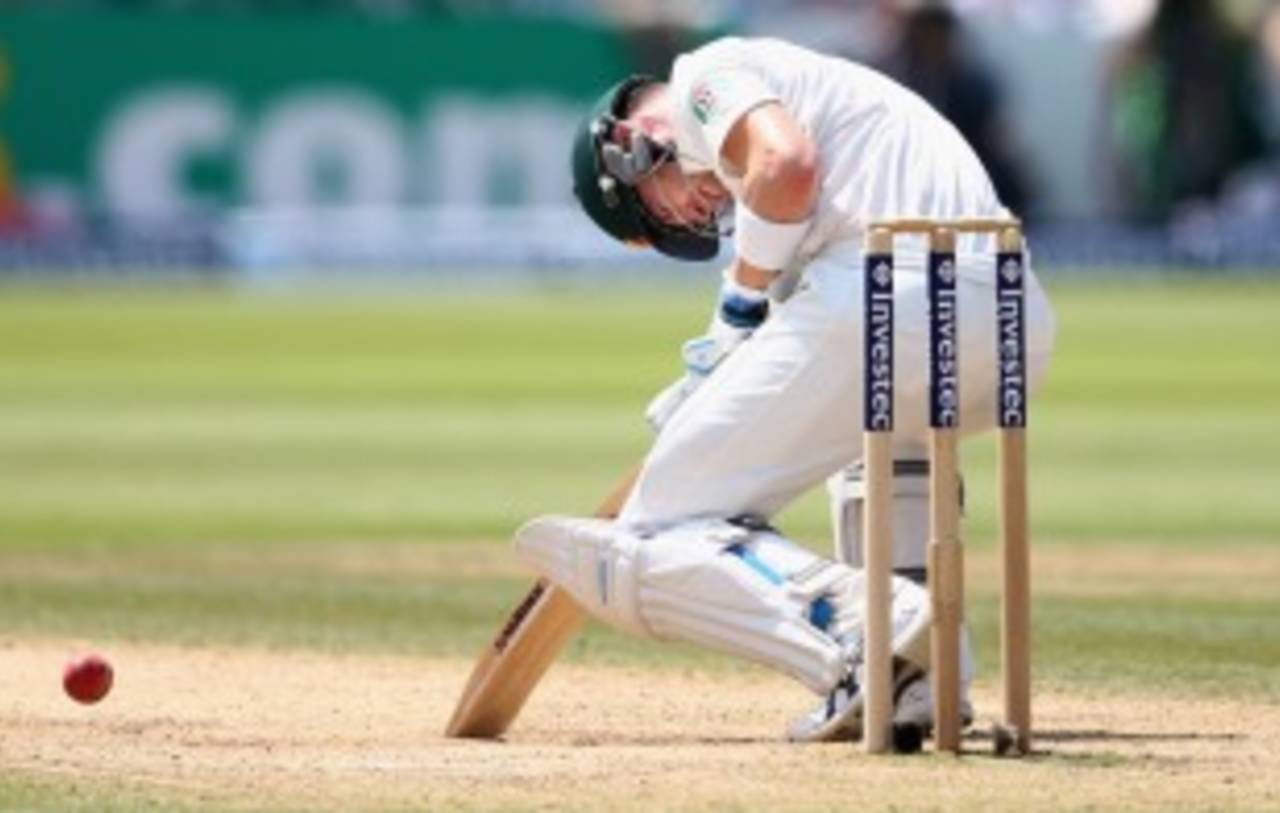Sport is a battle not just for supremacy but also for primacy. Who had the greatest influence on the result? Did Team A win the game or did Team B lose it? Every wicket, boundary, goal or try begets analysis: how much was down to good play and how much to bad? In tennis terms, what was the balance between winners and unforced errors.
In 2010-11, when England marmalised Australia, it felt as if it was more about their excellence than their opponent's limitations. That balance changed at Lord's over the last four days. This has been a landmark match in an era of Ashes cricket, the time when what should be one of the most precious things in cricket - an Ashes victory - became almost a formality. In the age of 140 characters, the last day is easily summarised: England bowled dry and Australia's batting was wet.
Our reference points have travelled 20 years inside a week. Last Sunday was all about 2005; now
it's 1985, when England battered a feeble Australia 3-1. It seems history will record this series in a similar way, as an uneven contest between a good side and a poor one. There is one difference: this time England might be disappointed with a 3-1 victory. Yet it's hard to know quite what it all means. They have had tougher Tests against Bangladesh.
For many there is understandable schadenfreude and an unapologetic sense of payback. For those who grew up secretly idolising the Baggy Green and asking themselves in any given situation, "What would Steve Waugh do?" there is significant sadness to see an Australian side so pathetic. You really wouldn't wish this on your worst enemy.
When people are using cliches like "You can only beat what's in front of you" or "Cricket needs a strong Australia" - never mind wheeling out the old jokes about whether they deserve a five-Test series and whether runs and wickets against Australia should officially count - you know there is a problem. The cricket world is off its axis.
To misquote Martin Johnson, there is only one problem with this Australian team: they can't bat. The trouble is that their single problem is an absolute stonker. There was much criticism of Australia's batting before this series, yet they haven't even lived down to expectations: they are much worse than we thought.
Their performance in
the second innings was that of men whose basic faculties had gone. Shane Watson could have had a premonition, a DeLorean, the ability to freeze time and unlimited reviews and he still wouldn't have been able to stop his dismissal; Chris Rogers and Brad Haddin were out offering no stroke; and Steven Smith, like Phil Hughes in the first innings, didn't even know he'd hit the ball. At this rate, they might become the first team to employ a specialist DRS coach.
The top order wagged for much of the afternoon session, but then came the increasingly familiar collapse: 5 for 28 to go with 10 for 86 in the first innings and 5 for 9 at Trent Bridge. During Ashes series in the 1990s it was often said that England were "five out, all out". At the moment Australia are almost nought out, seven down before their lower-order show them how to bat with pride and purpose. The top order needs to go into batting rehab.
What Australia would give for the following top six: Greg Blewett, Matthew Hayden, Damien Martyn, Michael Bevan, Justin Langer and Ricky Ponting. That was the
A team line-up in the Benson & Hedges Series final
of 1994-95. Throughout Australia's years of world domination, their main fear was how they would replace Shane Warne and Glenn McGrath. Nobody worried about the batsmen. Whatever else, Australia would always produce batsmen.
Australia's inadequacies are not England's concern - you can only beat what's in front of you - and their celebratory fizz will taste just fine. Yet even they must be a touch unnerved by how easy this has been. They have played a good Test match, no more, and beaten Australia by 347 runs. England won a single live Ashes Test between 1987 and 2005; over the last four days, this team have done the same without getting out of second gear. It all felt a little low-key, a triumph without recourse to exclamation marks. Yes, England have (all but) won the Ashes.
Those exclamation marks might be needed later in the summer. England achieved full mental and physical disintegration in this match. The precedent of India 2011 - a series that started tightly and ended as an inevitable procession once the visiting team were broken - suggests a whitewash is a genuine possibility. By the time of the fourth Test at Durham, Howay Five-0 might be on everyone's lips.
In his new book, Matt Prior says that the idea of England leaving a legacy has become the most important thing in his career. This team have already done that by winning in Australia and India and not to becoming the No. 1 side in the world. Now they have the chance to do something that no England team has ever achieved: a 5-0 Ashes whitewash. That pursuit might be the only thing that stops this series descending into anti-climax. The only way for England to save this series is to make it even more one-sided.
